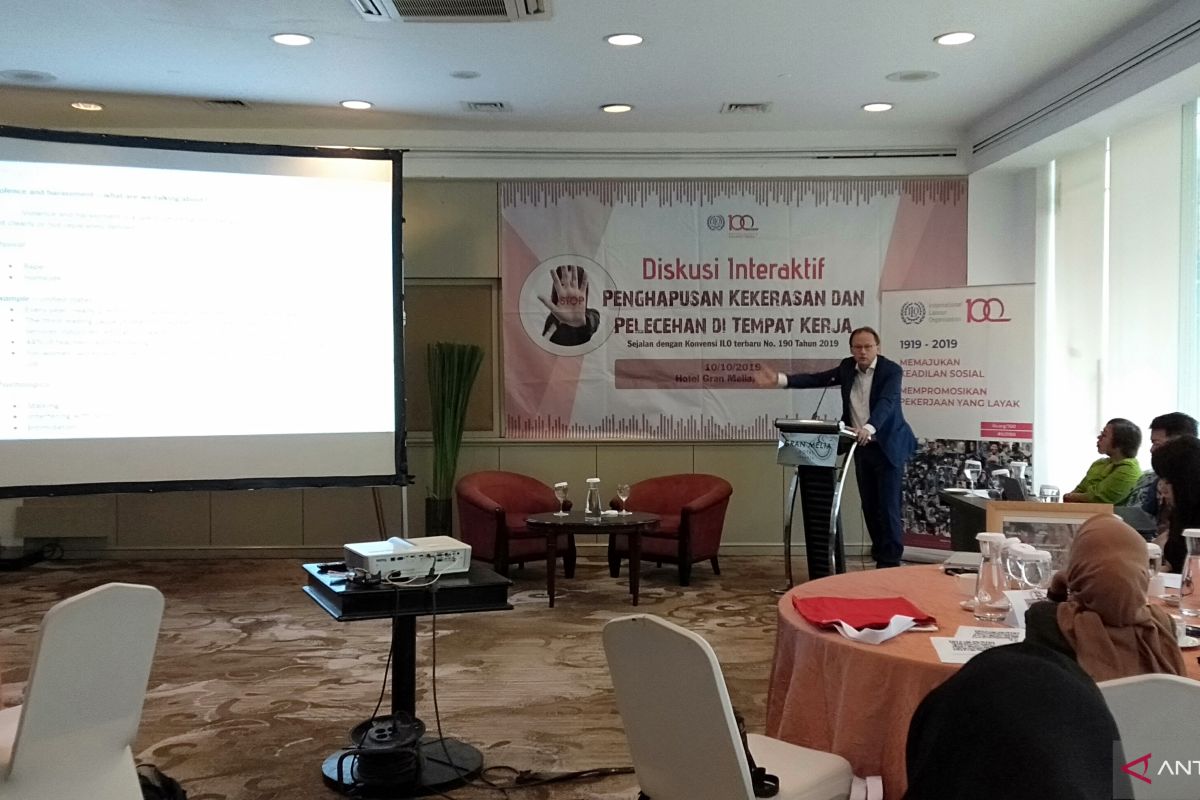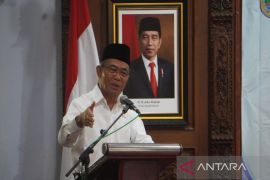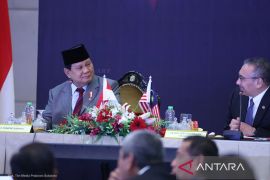The Baiq Nuril case courted controversy since the Supreme Court convicted the very victim of verbal abuse at the hands of her superiors.
Baiq Nuril was found guilty of taped evidence of sexual harassment distributed by her colleague that amounted to violation of the Information and Electronic Transaction Law (ITE Law) and defamation of the perpetrators of sexual harassment.
The victim of sexual harassment was compelled to serve six months' imprisonment and a fine of Rp500 million.
Witnessing the grave injustice that Baiq Nuril faced at the time, the community has called on President Joko Widodo to grant the former teacher amnesty.
This appeal was echoed by over 250 thousand people, who signed the petition of support for Baiq Nuril through the Change.org website.
Observing the mass outpouring of public sympathy and outcomes of discussions from several legal experts, President Widodo signed a Presidential Decree (Keppres) on amnesty for Baiq Nuril.
Thus, the president's decision freed Baiq Nuril from the snares of the law.
The Baiq Nuril case is one of several thousand cases of sexual violence in Indonesia.
According to the 2019 annual fact sheet of the National Commission on Violence Against Women (Komnas Perempuan), a total of 348,466 cases of sexual violence against women were recorded in 2018.
A total of 392,610 cases originated from those handled by the Religious Courts, and as many as 13,568 cases were handled by 209 Komnas Perempuan's partner services spread across 34 provinces.
A total of 9,637 cases, or 71 percent of the cases, occurred in the private/personal domain, or called domestic violence, wherein the perpetrators had blood relations with victims, kinship, or marital relations and dating relationships.
A total of 3,915, or 28 percent, took place in the realm of communities where the perpetrators did not have blood relations and kinship with victims, such as employers, teachers, work colleagues, community leaders, or also strangers.
In terms of the other cases, 16 were related to sexual violence committed on behalf of the state.
To ensure that other women in the world of work do not undergo the trial and tribulation experienced by Baiq Nuril, the trade union has called on the government to immediately ratify ILO Convention No. 190 and Recommendation No. 216 on the Elimination of Violence and Harassment in the World of Work.
The International Labour Organization (ILO) issued Convention No. 190 of 2019 concerning the Elimination of Violence and Harassment in the World of Work. The convention, adopted at the 108th ILO session in Geneva, Switzerland, June 21, 2019, contained various provisions, including recognizing the right of all to a world of work that is free from violence and harassment, including gender-based violence and harassment of women.
The statement was made by Sulistri, chairperson of the Food, Beverage, Tourism, Restaurant and Hotel Trade Union Federation (FSB KAMIPARHO), on the sidelines of an interactive discussion of ILO on eliminating violence and harassment in the world of work held in Jakarta on Thursday, (Oct 10).
What transpired with Baiq Nuril has exposed the grim reality that women constituted a group of workers, who were vulnerable to harassment or violence.
Based on events that took place on the field so far, victims of violence and harassment were ashamed to open up about what they had endured, Sulistri pointed out.
Workers, who reported their experiences as the victims of acts of violence or harassment, tended to be ostracized, and their voices remained unheeded.
"Victims of violence and harassment can convey their complaints to the people they trust. For this reason, victims must feel safe and comfortable when they lodge their complaints," Sulistri stated.
To this end, rules should be put in place to regulate and protect the victims of violence and harassment, who report their grievances to law enforcement officers.
"The Convention on the Elimination of Violence and Harassment in the World of Work also regulates it. This Convention is strong since it is accompanied by recommendations that become a reference for its implementation at the state level. The Convention aims to realize the future of the world of work, with dignity in the absence of violence and abuse in the work environment," Sulistri remarked.
In connection with efforts to eliminate violence and harassment at the workplace, she highlighted the need for character and mental development as well as raising awareness on the definition of violence and harassment in the world of work on a massive scale among all parties.
She deems this necessary since acts of harassment and violence in the world of work have a significant impact on worker productivity.
"When workers feel uncomfortable because they experience violence and abuse, then their productivity will decrease. The lowered productivity will also affect the performance of the company or institution where he works," he pointed out.
Application of conventions
The ILO encourages the application of ILO Convention No.190 on the Elimination of Violence and Harassment in the world of work, one of which aims to ensure the protection of workers regardless of a contract status of employment.
The convention's focus on inclusiveness is of paramount importance, thereby translating to the fact that anyone, who works, will be protected regardless of the contract status of employment, according to the ILO's senior advisor, Tim De Meyer.
De Meyer affirmed that apprentices, volunteers, job seekers, and people, who exercise authority as employers, are entitled to receiving protection under ILO Convention No.190.
This is also applicable to the public and private sectors, the formal and informal economic sectors, as well as urban and rural areas.
De Meyer drew attention to the fact that several groups of workers in certain sectors, positions, and work arrangements, were also especially vulnerable to violence and harassment.
Those working in the health, transportation, education, and household sectors or at night or in remote areas are highly susceptible to violence and abuse, he stated.
In addition, gender-based violence and harassment is one of the main areas of focus of ILO Convention No. 190, with an approach that also considers third parties, such as clients, customers, service providers, and patients.
This is since they can be victims or perpetrators too, De Meyer stated.
Furthermore, the convention on the elimination of violence and harassment in the world of work considers the impact of domestic violence in the world of work.
In addition, De Meyer defines violence and harassment at the workplace as a series of behaviors that occur repeatedly to cause injury or have adverse effects on a person's physical and psychological state.
"Violence and harassment occurring in the world of work is not a standalone behavior but a series of unacceptable behaviors and practices that cause injury or adverse effects on a person's physical and psychological state. Violence and harassment in the world of work do not occur only once but repeatedly to the same victim," De Meyer stated.
The definition of violence and harassment in the world of work is stipulated in ILO Convention No.190 on the Elimination of Violence and Harassment in the World of Work.
De Meyer expounded that the convention adopted a pragmatic approach, specifically defining violence and abuse as a series of unacceptable behaviors or practices that resulted in physical, psychological, sexual, and economical harm.
The convention did not differentiate between the definition of violence and harassment. The definition of violence and harassment included physical torture, verbal abuse, beatings, sexual harassment, threats, and stalking, he pointed out.
He said the convention also took into account the conditions and ways of working in the modern world, where work activities were oftentimes not conducted in physical workplaces, such as offices.
Hence, ILO Convention No. 190 also covers communication related to work, including those that might occur through information and communication technology.
De Meyer stated that the convention provides a clear framework of action for efforts to shape the future of the dignified world of work.
This convention also offers an opportunity to shape the future of the world of work that is free from all forms of violence and harassment, he remarked.
Regarding changes in behavior, De Meyer admits to behavioral changes not being easy. However, the adoption of strong instruments, such this convention, will send across a strong message.
"It will make, what has not been seen, more visible. We know that the action is harassment and violence. However, sometimes, it is difficult to define or narrate the action into a rule," De Meyer stated.
All parties should address the underlying causes of all this, including various forms of intersecting discrimination, gender stereotypes, and gender-based special relations.
Risk assessment at the workplace, as stipulated in the Convention and further in the Recommendations, can also help in changing behaviors, as it takes into account various factors that increase violence and harassment.
The convention also highlights the need for training and actions that will increase understanding.
ILO Convention No. 190 will take effect 12 months after two member countries ratified it.
Taking into account the huge support demonstrated when the convention was ratified, we are confident of this convention taking effect quickly.
The Convention No.190 will have an impact since all member states will be urged to pay attention to their national authority.
Thus, this issue will garner attention at the national and international level.
The birth of Convention No. 190 of 2019 concerning the Elimination of Violence and Harassment in the World of Work is able to create a world of work that is free from violence and harassment in various forms and in varied types of work and workplaces.
This convention regulates broadly the definition of the world of work that encompasses public and private spaces and the definition of workers, both formal and informal, such as domestic workers and homeworkers.
As a result, the convention can be used to offer broader protection.
However, the convention will become effective if member countries of the United Nations, who make the instrument, ratify it into a standard rule.
Indonesia, as one of the 387 countries supporting the birth of the Convention No.190, should immediately formulate a strategy towards ratification and implementation as a form of recognition to realize the future of a more dignified world of work.
Related news: Indonesia urges ILO to mobilize support for Palestine
Related news: Domestic workers are often invisible: ILO
Related news: Indonesia re-elected as member of ILO`s governing body
EDITED BY INE
Editor: Fardah Assegaf
Copyright © ANTARA 2019












